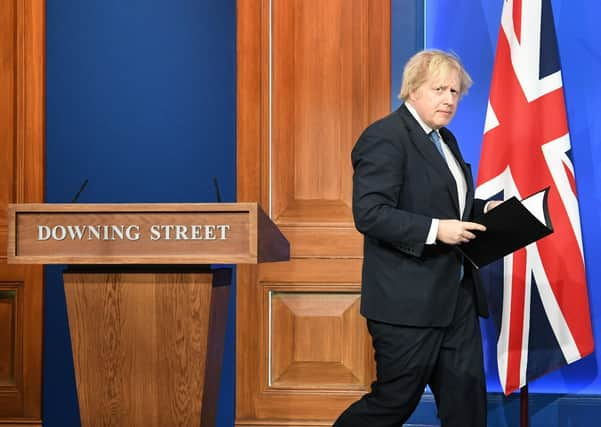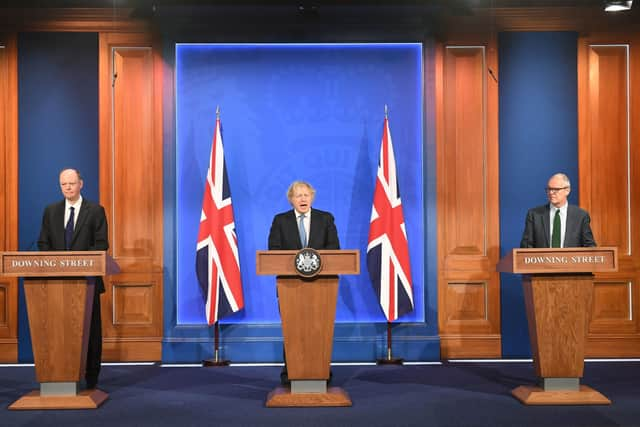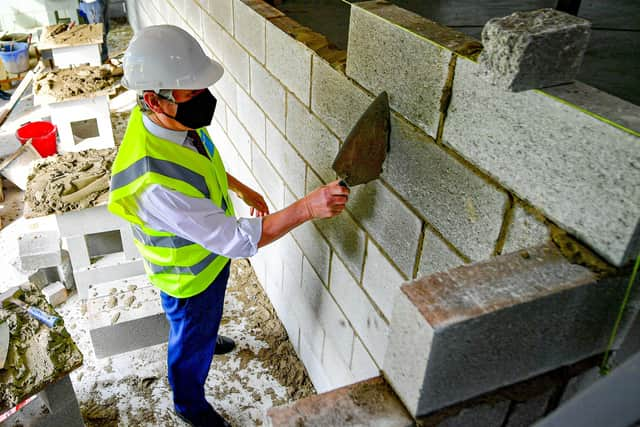High stakes for Boris Johnson and Keir Starmer in local elections – David Blunkett


This was, of course, billed as a “government briefing” on Covid, so who could possibly object to using public resources, and to persuading the media to broadcast the Prime Minister’s presentation in real time?
In the end, the briefing didn’t add up to a bag of beans. There were no new announcements, but merely a repetition of the already announced steps in the roadmap for “recovery”.
Advertisement
Hide AdAdvertisement
Hide AdFurther announcements were promised for later in the week on the crucial issue of travel – once the Government had got its act together.


If it weren’t for the fact that I am a Labour member of the House of Lords, and therefore an opposition politician, I might find nothing exceptional about the Government continuing to hold high-profile briefings during the course of April.
But given my life-long experience in politics, I find it necessary to point out that we would normally be in what’s described as “purdah” where limits are placed on communications activity leading up to substantial elections across the whole of England, and for the Scottish Parliament and Welsh Assembly. Elections that involve local councillors, Police and Crime Commissioners and, here in Yorkshire, the first ever election of a metro mayor in West Yorkshire. Not forgetting, of course, the Hartlepool by-election.
These elections are being held under unique circumstances outside wartime. The public, rightly, expect reasonable updates of government advice and policy in relation to Covid and the return to some sort of normality. Plans for a more equal and more just post-Covid society still seem a long way off.
Advertisement
Hide AdAdvertisement
Hide AdBut the lesson of the moment must surely be that the success of the vaccine rollout has been because of decentralisation and local delivery. We owe the NHS, those working for it and volunteers working with it, a deep debt of gratitude.


Unlike test and trace, purchase of protective equipment and the delivery of public health measures more broadly, this time it wasn’t a top-down national bureaucracy.
Local government has been so badly neglected for years and local democracy has been effectively trashed. At the beginning of this pandemic, those in charge of public health could have made such an enormous difference, had there been sufficient trust in them to do more than ask them to pay out grants to struggling businesses and to try and keep public services afloat, including beleaguered social care.
Just at the moment when Labour Leader, Sir Keir Starmer and his frontbench colleagues fight to get any kind of a hearing or break through the media diversion onto anything except the forthcoming elections, the emphasis on community, building from the bottom and engaging local people, should be elevated to the forefront of the agenda.
Advertisement
Hide AdAdvertisement
Hide AdIt is true that no opposition was likely to counterweight the total domination of the political agenda by a government dealing with a pandemic. But a year on from his election, Starmer has the unenviable task of continuing his progress towards making Labour electable again, whilst giving the people a reason not to elect his opponents.
That means not only ongoing efforts to expose cronyism, the misuse of public money and the major mistakes made during 2020, but to recognise that, at this moment in time, it is unlikely that the electorate will be aroused to punish a government that has, at last, appeared to do something right!
Politics doesn’t work that way. Instead, you must have some eye-catching thinking of your own. You need those representing the party to have something genuinely interesting to say, and to say it in a forthright manner.
The lesson I bring from the past is that we must challenge the mainstream media, particularly the broadcast media, that they have an obligation to provide some political balance – especially in the run-up to major elections. Our democratic process depends on us having the right to put alternative viewpoints and for them to be heard and discussed.
Advertisement
Hide AdAdvertisement
Hide AdBut from where I sit, it looks like there is an unholy combination of ignoring the accepted rules of combat on the one hand, and pretty much ignoring the elections on the other.
In 12 months’ time, when being vaccinated against Covid-19 will be as familiar as the normal winter flu jab, those accountable for services across the British Isles will be carrying out their normal tasks. Who they represent and how they represent them will be determined on May 6, which is why it is vital that people vote, and vote on critical issues of our future – way beyond the shadow of the virus.
Do you want a continuation of top-down, command and control rules, with reconstructed public health, centralised in Westminster and Whitehall, or would you prefer devolved administration, with accountability at local level and the resources to implement radical policies for rebuilding and regenerating our localities?
I think that’s a fair question for starters!
David Blunkett is a Labour peer and a former Home Secretary.
Advertisement
Hide AdAdvertisement
Hide AdSupport The Yorkshire Post and become a subscriber today. Your subscription will help us to continue to bring quality news to the people of Yorkshire. In return, you’ll see fewer ads on site, get free access to our app and receive exclusive members-only offers. Click here to subscribe.
Comment Guidelines
National World encourages reader discussion on our stories. User feedback, insights and back-and-forth exchanges add a rich layer of context to reporting. Please review our Community Guidelines before commenting.